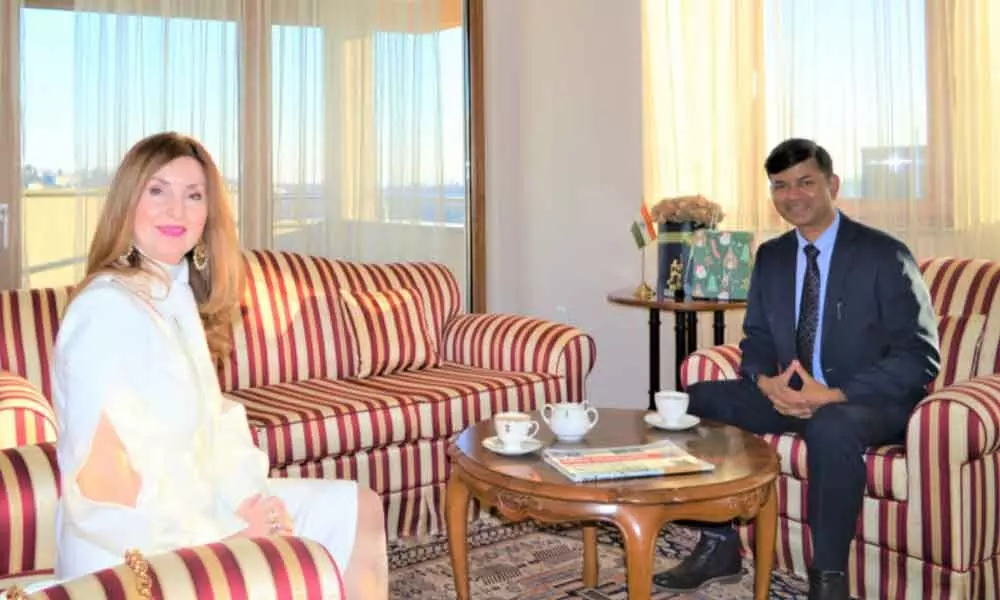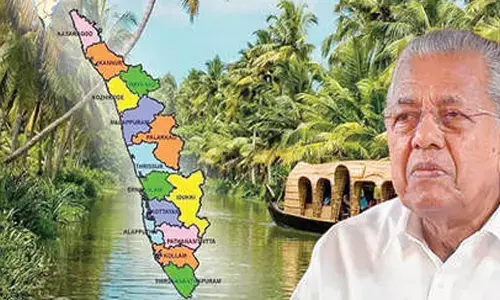Indians feel proud of their democratic, secular values

Ambassador Raj Kumar Srivastava with Ina Stasevic
Compared to some other countries, large and small, India celebrates many holidays and festivals, but there are only three national holidays: Republic Day (January 26, Independence Day (August 15) and Gandhi Jayanti (October 2).
Compared to some other countries, large and small, India celebrates many holidays and festivals, but there are only three national holidays: Republic Day (January 26, Independence Day (August 15) and Gandhi Jayanti (October 2). HE Raj Kumar Srivastava, Ambassador of the Republic of India to the Republic of Croatia, talks about the Republic Day being celebrated all over the country.
1. What does Republic Day mean for your country?
Republic Day marks the entry into force of the Constitution of Independent India in 1950. This year will be the 73nd anniversary of our Constitution, which is the foundation and guiding document of the largest democracy in the world. The 145,000-word Indian constitution was the longest national constitution ever adopted. It emphasizes the commitment of the people of India to affirm, secure and achieve the various national goals in peaceful and democratic ways. It directs the nation to realize the dreams and aspirations of the people by adapting to the changing needs and realities of the times. The preamble to the Constitution begins with "We, the people of India, ........", clearly showing the central role of the people. The Indian people have every right to feel proud of democratic and secular values, as well as of establishing an inclusive social order. This year is special because we are celebrating the 75th anniversary of India's independence with numerous cultural, business, sports and artistic events in Croatia, such as the "India in Croatia" festival, which began on January 18 in Zagreb.
2. In your rich history through Indian stories, schoolbooks teach that the whole world/universe is a family. What is your role, your responsibility? What values do you cherish?
India, as one of the oldest civilisations, has a solid foundation of thinking, values and way of life. The oldest books, the Vedas, contain knowledge of universal values, which gave a clear basis for the purpose of human life. Despite our differences today around the world, one thing most of us agree on is that we are all looking for happiness. Therefore, belief in the principle of 'one world one family' or 'Vasudhaiva Kutumbakam' (the core of Indian thought) is not excessive. In fact, it is extremely empowering, especially when we are dealing with global challenges such as climate change or as we have seen in the last two years of the pandemic. India's action on both of these specific global challenges is recognized worldwide today. And that is reflected in our space program, the agricultural revolution or our ICT and technological achievements.
Accordingly, my role and responsibility stem from this broad people-centered approach so I am focused on connecting the people of our two countries. For me, the most important value I cherish is living the moment to the fullest with my potential with sensitivity to the people and environment around me. I derived this from my understanding of the most relevant book, The Gita, which mentions that "taking action without expecting results is the best way to achieve happiness."
3. While living in India, I learned and later applied the postulates: You don't have to worry about tomorrow, just live and rejoice today. There are also the gods Vishnu and Krishna, as well as obligatory yoga, among many other specialties. What exactly is the core of Indian philosophy, Hindu philosophy?
At the core of Indian philosophy is the belief that we are all part of the supreme power and that we are therefore all capable of achieving any goal within ourselves. At the same time, the belief that we are all connected, because we all come from the same universal energy source, gives us a sense of inclusion. Another important concept in our philosophy is service - as long as we take a service from someone, we should return the service to someone else. Finally, the theory of karma provides us with a rational basis for continuing our actions in the right direction without being hindered by the current conditions or the results we get.
Speaking of Indian philosophy, it would be wrong not to mention yoga. Since 2015, the whole world has been celebrating International Yoga Day on June 21 and it is an extraordinary achievement of bringing global unity into diversity through the practice of yoga. In our philosophy, we qualify four different types of yoga that people follow in their lives based on their preferences and character. Each of these yogis has a common element, and that is the creation of unity between oneself and others, although through different paths - concentration, work, love or thoughts.
4. The religious diversity of India, castes, different cultures and traditions, a real "melting pot", as many as 29 states and one federal government… all these are truly impressive facts. How the current PM Narendra Modi manages to put it all together. What is his guiding thought?
Diversity is one of the four essential elements that define India today - democracy, demand, demographics, and diversity. In India, you see diversity in everything that comes to mind - in cuisine, customs, culture, climate, languages, religions, etc. India's unity in this vast diversity stems from civilization values and beliefs that India has for thousands of years. The unity of mutual respect, respect for the potential that exists in every human being and the fact that we are all of the same origin. PM Modi focused on the people of India giving the Government a mandate to govern. Some of the key initiatives of his Government have been extremely successful, empowering the people of India. His motto is "Maximum management with minimum government". We focus on job creators, not job seekers and therefore education in India is focused on skills.
5. Mahatma Gandhi made a great contribution to the Indian struggle for freedom, he played a key role in the Indian independence movement. How do you think the world looks at India today?
India is today considered a global leader in many areas. It is considered one of the strong poles in a multipolar world that provides much-needed peace, stability, and prosperity. As a non-permanent member of the UN Security Council in 2021, the international community has recognized India's role and actions as crucial to paving the way for India to become a permanent member of the reformed UN Security Council soon.
6. Today, India is a fast-growing economic power with a diversified economy and good opportunities. According to indicators, you have a great economic future. What are the advantages of India, what resources are available in your country?
The most important resource that India has are its people. As I mentioned democracy, demand, demography, and diversity are the strengths of India. We invest a lot in the development of our infrastructure with a view to sustainability, and in improving the efficiency of our economy. We do this by introducing technology and best practices. The next two decades of Indian growth provide great opportunities for successful European companies to invest in India and benefit from it.
7. For the last 20 years you have had the expansion of transport connectivity, you have built many new roads and infrastructure… By rail you have connected New Delhi and Varanasi with the world class Mahamana Express train, which is outstanding. What does Varanasi mean for India?
Varanasi is a symbol of Indian civilization in terms of its antiquity and its splendor in both materialistic and spiritual terms. Varanasi literally means the land between the two rivers Varuna and Asa which flowed in ancient times. The second name of the city 'Kashi' means light in a spiritual sense because it was the city of Lord Shiva. Archaeological finds prove that Kashi is almost 4000 years old. It continues to attract people because of the unique experience the city provides with its ceremonies and traditions of birth and death, both of which are celebrated as part of a continuum of life. The city with its metaphor truly represents Indian philosophy.
8. You have been living and working in our country for a little over a year. How do you assess the business atmosphere in Croatia? Are we a flexible enough country to invest and is there room for improvement?
I have been in Croatia for more than 15 months and I must say that, despite the pandemic, the Croatian economy and the Croatian people have managed to keep their lives and livelihoods intact in a better way than many other countries in the world. Improvements are, of course, possible and that should be the focus for the future. As it joins Schengen this year and next year, Croatia will probably remain active in its EU-oriented approach, including the use of EU funds. This would create liveliness in the Croatian economy and create opportunities for Croatia's partners in developing a futuristic economy based on digital innovation, environmentally friendly smart infrastructure development, and social integration programs to help Croatian citizens find the right work balance of life. I could say that 2022 could be the beginning of a new partnership between NewIndia and NewCroatia based on our complementarities in the fields of talent, technology, trade, and tourism.
9. After the US and China, you are the third largest higher education system in the world. For example, the University of Hyderabad has a high international rating. How much do you invest in higher education, which disciplines are you most focused on?
Education is an important element of the social infrastructure in which the Government of India invests a lot. We are using new technology and new methodologies to improve our education systems to become skills-based and results-oriented. Our natural strength in mathematics and science would certainly continue to contribute to our growth aspirations, but we are also aware of the importance of a diverse human resource fund to address global challenges and therefore our education system also gives due weight to innovation, sport, and humanities to create an independent India which we could be proud of in the future.
10. January is the month of the opening of the "new door" with new challenges and opportunities. Which project are you most proud of, and it was realized between India and Croatia, and what awaits us in the future on a bilateral level?
While the New Year is a good time to look back and learn lessons learned from the past and focus resolutely on the future, I personally believe that life is a continuous journey, and the process never stops even at milestones. I am happy that the past 15 months, despite the challenges of the pandemic, have brought many results in strengthening India-Croatia relations, some of them - the first visit of the Indian Foreign Minister to Croatia, the first international yoga and Ayurveda conference in Zagreb, and the establishment of Indo-Croatian Startup Bridge. More new partnerships could be established between our educational institutions, paving the way for internships, joint research and development, and youth and teacher exchange programs. I can predict that our future relationship will experience exponential growth for the people of our two countries. In the field of sports, some new opportunities for cooperation and development have also opened ...



